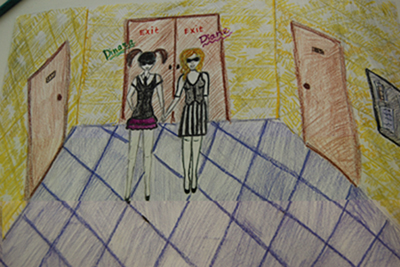Last year we had an unusual situation in my school. Diane
joined our class, but she always looked sad and she always wore
dark sunglasses. None of my classmates would talk to her.
One day our teacher said: “Dinara, you are the head of the
class, so why don’t you try to communicate with Diane? She’s
not bad!”
The next day, I went up to see her and said, “Hello, Diane!
How are you?”
She replied, “Hi! I’m O.K.” And that was that. It looked like she didn't want to be friendly.
Day after day, I began a conversation and over and over
again, she said little. Finally, after a week she said, “Thank you
for talking to me, Dinara! You are very nice and kind to me, but
I’m afraid you’ll change your opinion about me if I tell you why
I always wear sunglasses”.
I answered, “You shouldn’t worry! Tell me, I want to
know!”

Then she told me her sad story. Diane had only one eye. She
lost the other one when she was four years old. “I always put my
glasses on, because I don’t want anyone to see my ugly eye.”
“Oh, don't worry. I am your friend. There is nothing to
worry about.” Diane was grateful that unlike many other silly
children of my age, I could accept her secret. Only after that conversation I realized how it would be difficult to study in our
class - without any support - without any friends.
Diane decided to share her story with the class, so that they
wouldn't have the wrong idea about her wearing glasses, but the
reaction was awful. To my shame most of the classmates began
to laugh at Diane and call her names like “Fool blind girl” or
“One Eye”.
Diane started crying. It was such a shock for her! I was mad
and screamed from the top of my lungs: “Guys, it is wrong for
you to act like this. Having only one eye does not mean she is
stupid. And it doesn’t give you any right to call her bad names!
We study in one class; we need to be friendly to each other and
we have to help each other. She is as good as you and me”. I
couldn’t stay in that classroom. Diane and I left together.
Next day something miraculous happened. All the girls and
boys asked Diane to forgive them for their rude behavior; they
asked her questions and helped if she needed any kind of
assistance. Finally, Diane had become a member of our class and
I am proud of my classmates, because they were wise enough to
understand that we are all different, but all equal.
Exercises
I. Understanding the Story
With a partner, answer these questions.
1. How was Diane different from her classmates?
2. How did the classmates act toward her?
3. What did the teacher ask Dinara to do?
4. Why didn't Diane talk to Dinara at first?
5. Why does Diane wear sunglasses?
6. How did Dinara react to Diane's story?
7. How did their classmates react to Diane's story?
8. What did Dinara and Diane do after the class reacted?
9. What did the classmates do the next day?
10. What conclusion do you make from these answers?
II. Vocabulary
Match the words with the synonyms or definitions.
A. grateful |
1. help |
B. opinion |
2. people talking together |
C. conversation |
3. thankful |
D. realize |
4. magical |
E. miraculous |
5. idea |
F. assistance |
6. know |
III. Now you Talk
1. What would you say to the class if you were the teacher?
2. Have you ever been in a similar situation? Describe it.
3. How else could Dinara have helped Diane?
IV. Now you Write
Write a description of two of the characters.
V. Role Play
1. Diane and the writer: Their first real conversation.
2. The writer and two girls: She talks to them about Diane.
3. The teacher and two students: She tells them they are wrong.
4. The writer and two boys: She tells them they are wrong.
5. The writer and her mother: The writer reports on what
happened in the class. |

